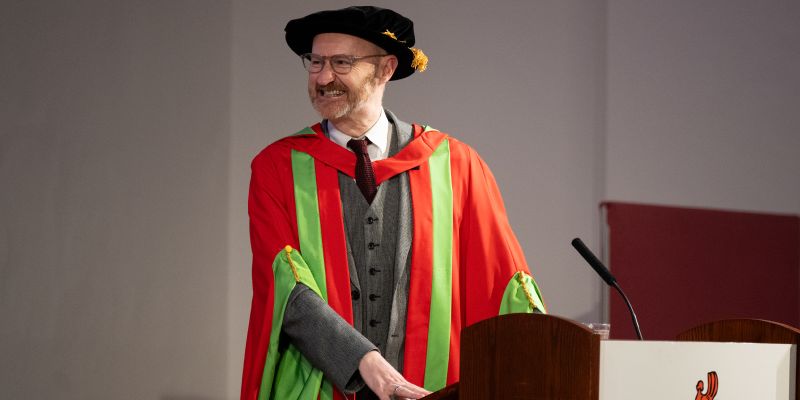
On receiving an honorary degree from the University, Mark Gatiss discusses his time at Bretton Hall, the alchemy between The League of Gentlemen, and the future of the arts.
An avid fan of Doctor Who, Mark Gatiss (Drama 1989) spent much of his childhood dreaming of becoming a doctor.
“I could only pretend, though, because all I could ever do was act and write,” Mark says. “I was hopeless at everything else.”
For an actor, writer and director of such repute, a satisfying ending – in the form of an honorary degree – is only right.
His accolades now include the Laurence Olivier Best Actor award for his portrayal of Sir John Gielgud in The Motive and the Cue. He co-created and starred in the BAFTA and Emmy-winning BBC series Sherlock. He’s starred in Wolf Hall, Game of Thrones, and Mission Impossible. He’s written for and appeared in the modern revival of Doctor Who.
But Mark is best known for his part in The League of Gentlemen, the award-winning comedy-horror sitcom set in Royston Vasey, a fictional town in northern England. He met fellow co-creators, Steve Pemberton and Reece Shearsmith whilst studying at Bretton Hall – which later became the core of the School of Performance and Cultural Industries of the University of Leeds.
"I still remember when me and Steve saw Reece’s photo on the arrivals board,” Mark says. “He was pulling a stupid face, of course. The three of us bonded immediately. We’d basically had the same childhood.”
That meant northern working-class roots, watching heroes on the television and enjoying the same comedians and films.
Growing up in Sedgefield, Country Durham, television provided Mark with a window to the rest of the world (and beyond, in the case of Doctor Who). He would draw pictures of his heroes then watch the credits, trying to figure out the difference between the script editor and the producer. “I knew it was what I wanted to do, but it didn’t feel achievable.
“The people on TV were always posh, and there was no reflection of life as I knew it. Even the alien invasions John Pertwee was dealing with [in Doctor Who] took place in the southeast of England.”
The emergence and success of Alan Bennett changed that. The actor, author, playwright and screenwriter’s humble beginnings helped Mark to believe it was possible. Mark took drama at school, attended youth theatre on Friday nights, drama club after hours, and put on countless shows at the Arts Centre in Darlington. He eventually received a grant to attend Bretton Hall.
It’s very hard to give advice. It’s traditional to sit from a place of great sagacity and give out wisdom. But none of us know.
Mark, Steve and Reece honed their craft at the College, where they had the freedom to put on shows in a relaxed environment with the perfect facilities to do it. “Bretton let us try things out. We became very self-reliant, and we became very optimistic. We were isolated which made it feel quite special, I think. It allowed us to have a more imaginative approach.”
And, perhaps, Bretton provided inspiration for some of the characters in The League of Gentlemen? “No comment,” laughs Mark.
Mark recalls the trio, along with Leeds alum and co-writer Jeremy Dyson (Philosophy 1989) staying in to watch ‘Carry On Screaming!’ instead of joining their classmates on bonfire night. “If there was a biopic – which there wouldn’t be – that's how it would start. Four boys hunched in front of the TV and missing the fireworks. We were obsessed.
“It’s also no accident that we’re all northerners. The North is mocked in a way by southern attitudes, but it's a very distinctive, special and funny place. The people are friendlier. As they say in Red Riding, ‘we do things differently here’.”
The four won the Perrier Award at the Edinburgh Fringe Festival in 1997. The League transferred from stage to radio and then television in 1999, and is credited with bringing a radical new approach to comedy, a blend between the disturbing, moving, and brilliantly funny.
“I believe strongly that we shouldn’t obsess about demarcation of genre,” Mark says. “Life is a strange mixture so it’s silly to carve things up into pointless boxes. A horror film can be funny for the first 10 minutes so you grow to like the characters. It’s important to be able to do that.”
For one who has bucked the trend through his life, his message to new graduates was similarly refreshing – as he gave a warning for the future of the arts: “It’s very hard to give advice. It’s traditional to sit from a place of great sagacity and give out wisdom. But none of us know.
“Television might be more representative than it was when I was young, but the paths into it are ceasing to exist and opportunities are fewer. The Arts Centre I used to perform in as a child is a block of flats now. Bretton Hall has gone.
“The arts are the first to go because of a systematic and conscious downgrading of their importance.
“We have to keep the flame alive. In a dark world, you’re going to have to fight for it.”
Further information
Watch the full interiew with Mark Gatiss on YouTube
For more information, email Ed Newbould, Digital Communications Officer at the University of Leeds, at e.w.newbould@leeds.ac.uk.